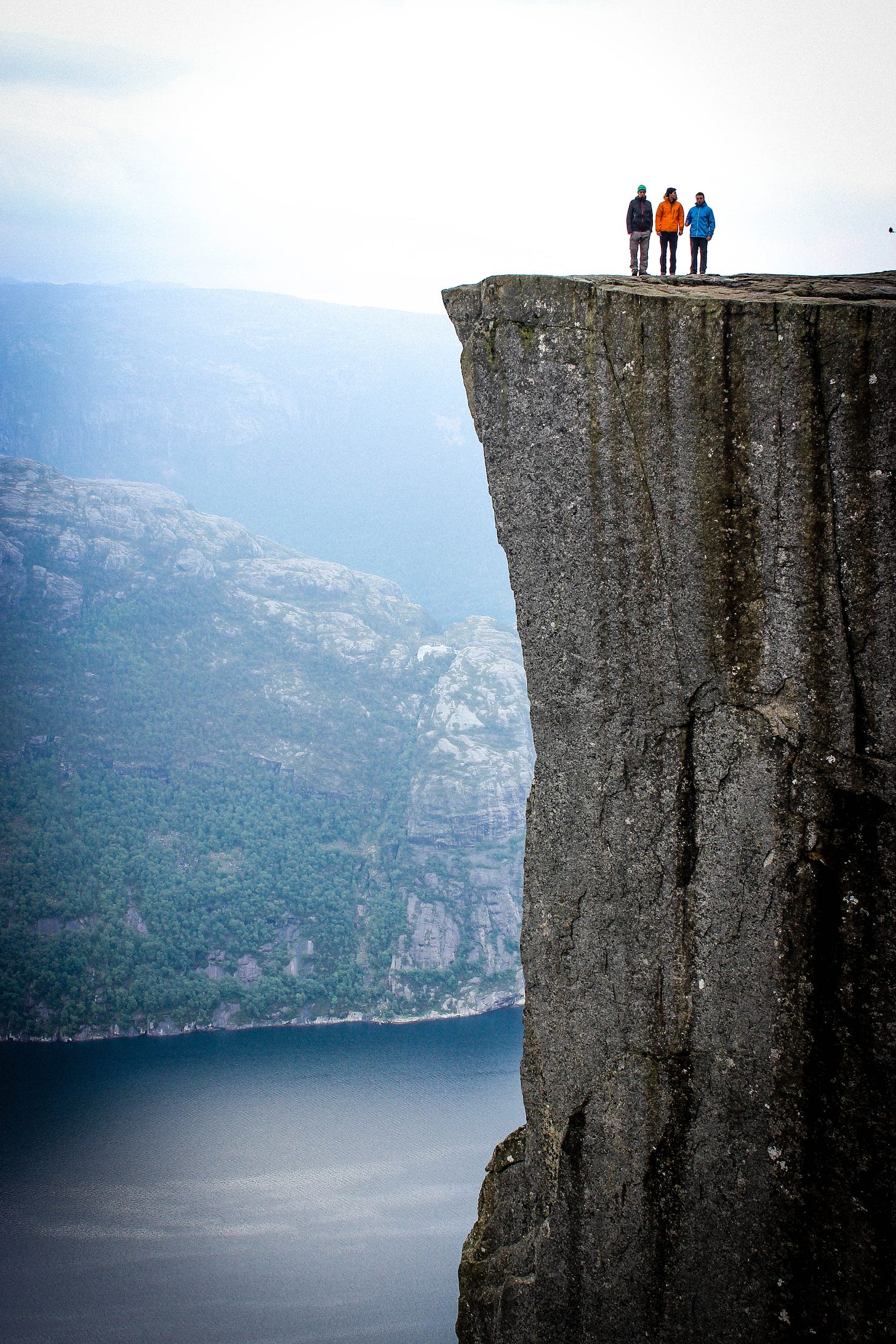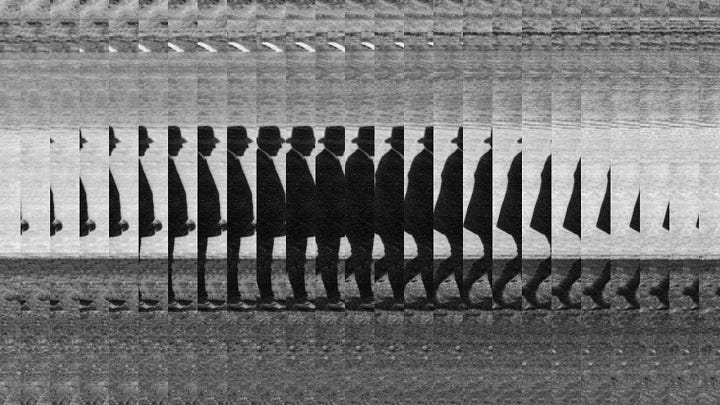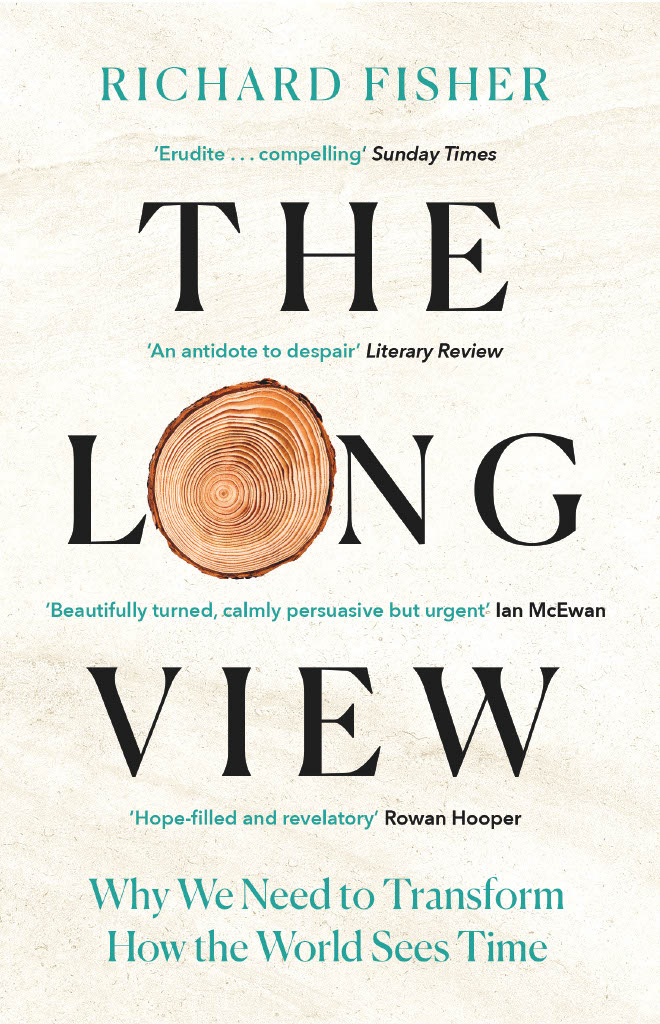You’re reading The Long View: A Field Guide, a newsletter about long-term thinking. This edition features the traps to avoid when taking the long view… plus a new special series about time that I commissioned for the BBC.
A question you might not expect from this newsletter: is the long view dangerous?
This month, I attended a symposium at Oxford University called The Dangers of Deep Time, in which academics from the humanities discussed the possible perils of long-term thinking.
I must admit I was a little hesitant about going. Given I’ve written a book called The Long View, it felt like I might be the turkey invited to Christmas. But I’m glad I went. While I didn’t agree with everything I heard, many of the critiques were enlightening and reasonable.
Here’s a summary of seven dangers discussed:
1. Chronowashing
A term coined by Michelle Bastian of the University of Edinburgh to describe how bad actors can use long-term thinking to launder short-term, harmful behaviours.
An example would be the billionaire who talks about ensuring the glorious far future of humanity in the cosmos… while in the present they are fostering political polarisation, exploiting workers, or committing financial fraud.
2. Misanthropy and nihilism
The writer John McPhee once proposed a metaphor for deep time, where planetary history is expressed as the length of a person’s arm. On this scale, human history could “be erased with the single stroke of a nail file”.
But by viewing the entirety of humanity as insignificant, it could open the door for misanthropy or nihilism.
The writer Robert Macfarlane once expressed it like this:
“There is a perilous comfort to be drawn from deep time. An ethical lotus-eating beckons. What does human behaviour matter when Homo sapiens will have disappeared from Earth in the blink of a geological eye? Viewed from the perspective of deserts or oceans, morality looks absurd, crushed to irrelevance. A flat ontology entices: all life is equally insignificant in the face of eventual ruin.”

3. Presentism bias
When historians use the word presentism, they don’t mean “short-termism”. Rather, it means to apply modern beliefs and attitudes to the study of the past. Similarly, long views of the future can be skewed by present-day values.
At the Oxford symposium, it was pointed out that secular modernity is a relatively new development in history – and it comes entwined with overconfidence in the virtues of science and technology. The danger here is that it may translate to a long view coloured by a narrative of progress and power.
“If deep time thinking simply extends modernity’s ideology of progress, then it may also bolster an anthropocentric sense of human mastery and control,” writes theologian Tim Middleton, one of the co-organisers of the Oxford event.
I suppose the target of this critique is the Silicon Valley-esque, techno-centric long view, caricatured by the hubristic, libertarian tech-bro who sees humanity’s future as a problem that his start-up can solve. But it’s a little older than that: as I’ve written before, a century ago, HG Wells was writing with unjustified optimism about technology’s path to utopia.
4. Universalism
Expand your perspective to deep timescales, and the temptation is to start talking about humanity in the language of universals: talking of “we” and “us” when actually that doesn’t necessarily include everybody.
“Just as not all humans are equally responsible for the Anthropocene, not all humans see the future through the same lens,” writes Middleton.
For example, the sociologist Bronislaw Szerszynski spoke about how different cultures think of time in different “shapes”. The linear view is a secularised, scientific perspective, he pointed out, but there are other temporal perspectives: circular, seasonal and so on.
5. Moral overconfidence
This one is levelled at strong longtermism. Specifically, the blunt utilitarian-esque approach of weighing the needs of trillions of future people against the needs of merely billions in the present. If you frame your appeal as “us and them”, with an emphasis on total combined happiness, then the sheer scale of “them” in the future risks outweighing any concerns and priorities we might have now. It might even justify harms in the name of that supposed greater good.
Another risk of moral overconfidence is that of unintended consequences. All the money, power and influence that longtermism has accrued has an amplifying effect. You aim for significant impact – and you get it – but not in the positive direction you hoped. As philosopher Toby Ord, one of the architects of longtermism, recently pointed out: maximisation is perilous, and particularly so if pursued without integrity and humility.
6. Quasi-spirituality
The subtitle for The Long View is “Why We Need to Transform How the World Sees Time.” In the book I write about cultivating one’s personal relationship with deep, sublime timescales. And the goal is to show how the world could be better if more people thought longer-term.
When I and others make such arguments in popular books, are we unconsciously borrowing rhetoric from Christian narratives? And is that problematic?
The philosopher and theologian Simone Kotva thinks so. “The idea of having the long view, and thinking about time in deeper ways, is seen as something that is structurally homologous to having a spiritual experience that will convert you into a different way of seeing, that will then save the future. In fact, the language of salvation is used explicitly,” Kotva explained at the Oxford symposium.
Why might this be a danger? By presenting deep-time thinking as conditional – “if you change your way of thinking, then we will be saved” – then it creates a barrier for entry, Kotva argued. “It makes a distinction between the enlightened elite who have the insight, and the others who don’t.”
In the same way that environmentalism occasionally veers into quasi-spiritualism, framing the long view as analogous to religious experience may risk apathy among those that don’t buy it. “I’m not at all convinced that we need to have feelings of awe and wonder in order to slow down the Great Acceleration,” Kotva said. “It becomes an end in itself and a distraction from focusing on the present”.
7. Charisma
Ecologists describe some animals, like gorillas, pandas or elephants, as “charismatic megafauna”. Due to their popular appeal, these creatures draw attention – and money – towards their conservation. Less charismatic animals, however, lose out.
In her talk in Oxford, Bastian suggested that a similar thing happens in long-term thinking circles: attention is filled by “charismatic megatimes”.
As an illustration, she highlighted the idea of the “atomic priesthood”, a proposed special order that would protect future generations from nuclear waste caches. The idea of some Dan Brown-esque priesthood, bound by a sacred duty over millennia, is charismatic. But Bastian pointed out that there are already people alive today harmed by nuclear legacies: the people of the Marshall Islands, the site of extensive atomic weapons testing in the 20th Century. Charismatic stories and projects validate and direct attention towards certain communities and ways of life, she says, but at the exclusion of others.
So, what do I make of these dangers?
In the closing pages of The Long View, I argue for a plurality of long-term perspectives. So, I was grateful to hear such thoughtful engagement from the humanities on these themes – even if I didn’t agree with every word.
An example of where I part ways? I’m not convinced that it’s problematic to focus on charismatic examples, or awe and wonder, when seeking to persuade people of the longer view’s benefits. In my experience, these are entry points – stories or emotions that help to draw people to the topic. In practice, it’s not “either-or”. (As for whether The Long View borrows Christian rhetoric… well, if there are echoes, it is completely unconscious!)
However, there are dangers that I heard which gave me pause: who is the “we” when talking about people past, present and future, and who might feel excluded? What happens if bad actors manipulate or misrepresent the ideas of long-term thinking for their own agendas? And how do you avoid assuming your own values and ethics extend over long-term time?
Do let me know your own thoughts!
(Thanks to Mel Cowans, Tom Moynihan and Tim Middleton for their input and suggestions.)
The ultimate guide to time
This month, I’ve also been thinking a lot about the physics of time. I commissioned a special about the topic on BBC Future pegged to the 60th anniversary of Doctor Who:
Firstly, I asked the writer Michael Marshall – who is a big Doctor Who fan – to weave together stories from the show with the real physics. He wrote these three in-depth features:
We also explored time more generally. So, the watchmaker Rebecca Struthers wrote about how innovations in clocks technology have shaped civilisation, psychologist Hal Hershfield imagined the questions you might want to ask if you ever met your future self, and astrophysicist Chris Lintott dived into relativity to explain why you age slower on a plane and what would happen to your view of time if you fell into a black hole.
(All of them have books that I’d recommend picking up: Mike’s book is The Genesis Quest: The Geniuses and Eccentrics on a Journey to Uncover the Origin of Life on Earth, Rebecca’s book is called Hands of Time: A Watchmaker’s History of Time, Hal’s is called Your Future Self: How to Make Tomorrow Better Today, and Chris has a book coming out in March next year called Out Accidental Universe: Stories of Discovery from Asteroids to Aliens.)
Finally, thanks to my colleague Javier Hirschfield who commissioned the artists Edouard Taufenbach and Bastien Pourtout to create the look and feel of the series, using vintage photos and collage:




Intergenerational Fairness Day
A number of organisations from around the world now seem to be joining forces to campaign for the rights of future generations. This month, nine of those groups marked "Intergenerational Fairness Day". They wrote a series of blog posts about their perspectives here.
On this theme, Hillary Clinton was also in Wales this month, and offered her opinion on the country’s Future Generations Act.
News about The Long View
If you’ve been struggling to get hold of a physical copy of The Long View in the US recently, I apologise. There was a shipment error that added a delay. If you can’t find one, the kindle and audiobook (read by me!) are readily available: Barnes and Noble had the ebook version for $2.99 when I checked today. And the UK retailer Blackwell’s ships internationally for free to many territories.
I’ll be in Brussels on 2 December speaking at the Full Circle Ideas festival. Come say hello if you are nearby!
Finally, I’m excited to share a sneak peek of the paperback design, coming in 2024:
Thanks so much for reading. I hope this time of year is treating you well, and I wish you all the best for the upcoming holidays.
best wishes,
Richard







I am a rank amateur, with no scientific background on the topic, but interested in the meaning and prospects of human presence in the deep timeline.
I've read Robert Macfarlane's "Underland", Jeny Odell's "Saving Time", and "The Long View" is on my reading list.
Learning the proportions between the history of humanity and the history of the universe, should lead not to nihilism, but to healing from hubris: we are custodians of the unique, precious gift of life, not almighty rulers of the world.
Any way of thinking which helps us understand our condition and take actions towards a more sustainable future is a good way, and I see a danger of looking for too many dangers: being too cautious and conservative might thwart our good efforts.
One idea, however, arouses my strong disapproval: that the cure for the harm done by technology could be more technology. I think here about geoengineering methods to tackle climate, like large scale stratospheric aerosol injections, or changing the constitution of the clouds. They are nothing more than meddling to our peril. (See "Under a White Sky" by Elisabeth Colbert.) The only way to survive is to consume less stuff, stop destroying the Earth's natural resources so rapaciously; and live less greedily.